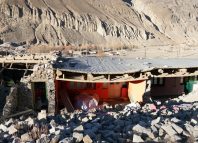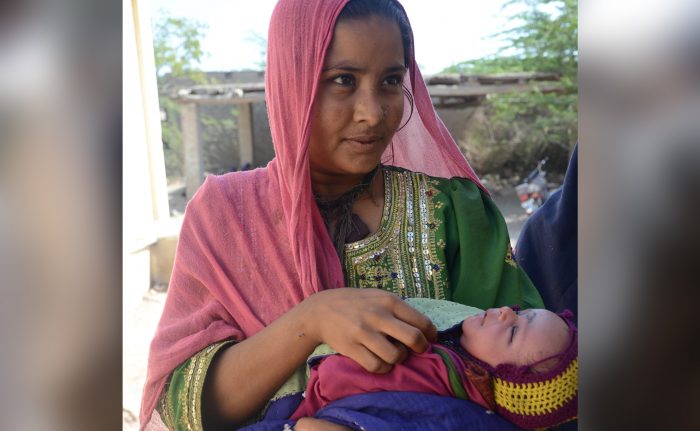| Duration | Jul 01, 2015 — Jun 30, 2018 | |
| Location | Doronaro, Hyder Farm and Nabisar of District Umerkot | |
| Key Activities |
| |
| Participants | 55,620 Individual |
MNCH
Securing health rights of women and children in rural Thatta
expressed a twenty-three years old, Zeena unhappily. The family of four, the family’s only source of income is her husband’s daily wage of approximately PKR 150 (USD 1.5). With this menial income, meeting everyday needs become very difficult for the family.It is difficult to manage all expenses within a small income like my husband’s. Healthcare treatments were most sidelined as the incoming money barely lasts a day with two young daughters and an elderly mother to care for. All of it is consumed in household expenses. If there was a dire need for healthcare, we would travel long distances to access services. It seemed like a burden in terms of both time and money. In addition, we women here are more dependent on men to travel far distances which makes it even more inconvenient to avail the healthcare resources,
Two years ago, when Zeena was expecting her second daughter, she heard of a Maternal Neonatal Child Healthcare (MNCH) center established in Ranta village from her neighbors. Upon finding out that the MNCH center is located near her village, Zeena’s husband allowed her to visit the MNCH on her own for a check-up.
After my first visit to the MNCH, I started visiting the center regularly through my nine months of pregnancy as prescribed by the lady doctor there. The doctor’s fees at the MNCH was minimal, thus very affordable for villagers like ourselves, who earn less and have no savings.
added Zeena who, along with her husband, was also given health and hygiene sessions at the MNCH for her to start developing a healthy diet during pregnancy and after.The services provided at the center were always timely and effective,
My hemoglobin was low therefore the lady doctor advised me to eat food which contains iron including fish, green vegetables and beans. My husband made sure I took a healthy diet as prescribed by the lady doctor as this time he was more aware.
expressed Zeena.I was also given a family planning session. It was the first time I took part in a session like this, as in our area there is no concept of child birth spacing. In fact, here parents opt for more children so that they can contribute financially once they grow up. I was very glad to know about family planning as it highlighted the importance of good health for women and infants,
Zeena adopted healthy and hygienic nutritional practices at home which improved the health of her baby and her during pregnancy. After her daughter’s birth, Zeena visited the MNCH for antenatal care regularly, which helped the doctor to treat and prevent potential health problems throughout the course of her pregnancy. It also aided in promoting healthy lifestyles in the village, benefiting both mothers and children.
After a smooth nine-month pregnancy, Zeena gave birth to a healthy daughter at the MNCH center without any complications as she had strictly followed the diet chart and took all her prescribed medicines on time. Zeena’s husband and mother-in-law were very pleased with the services and efforts of the staff at the MNCH.
shared Zeena’s mother-in-law.It is difficult to find effective services especially for pregnant women in our area. When Zeena was pregnant the first time, we had to travel to Belo city which was very costly and Zeena would get very tired during travel as well. The MNCH at Ranta is a blessing as many in nearby villages now have a proper health facility, which is affordable for our community, to go to. Zeena’s second pregnancy was very easy for us as I would bring her to the MNCH regularly as per doctor’s advice. The doctor guided us well and today I am blessed with a healthy grand-daughter,
Zeena has regularly been attending the MNCH for postnatal care. She was given a session on breast feeding by the midwives at the MNCH. Zeena was also advised on breast-feeding her newborn for six months and gradually to start feeding her small meals as per diet plan then after. The effectiveness and sustainability of the MNCH is empowering rural women and communities in many villages of Thatta. Moreover, the center is facilitating in addressing the health needs of the community and in raising awareness on health issues and rights of women and children.





